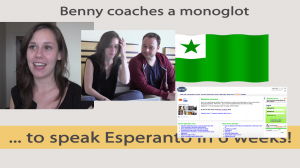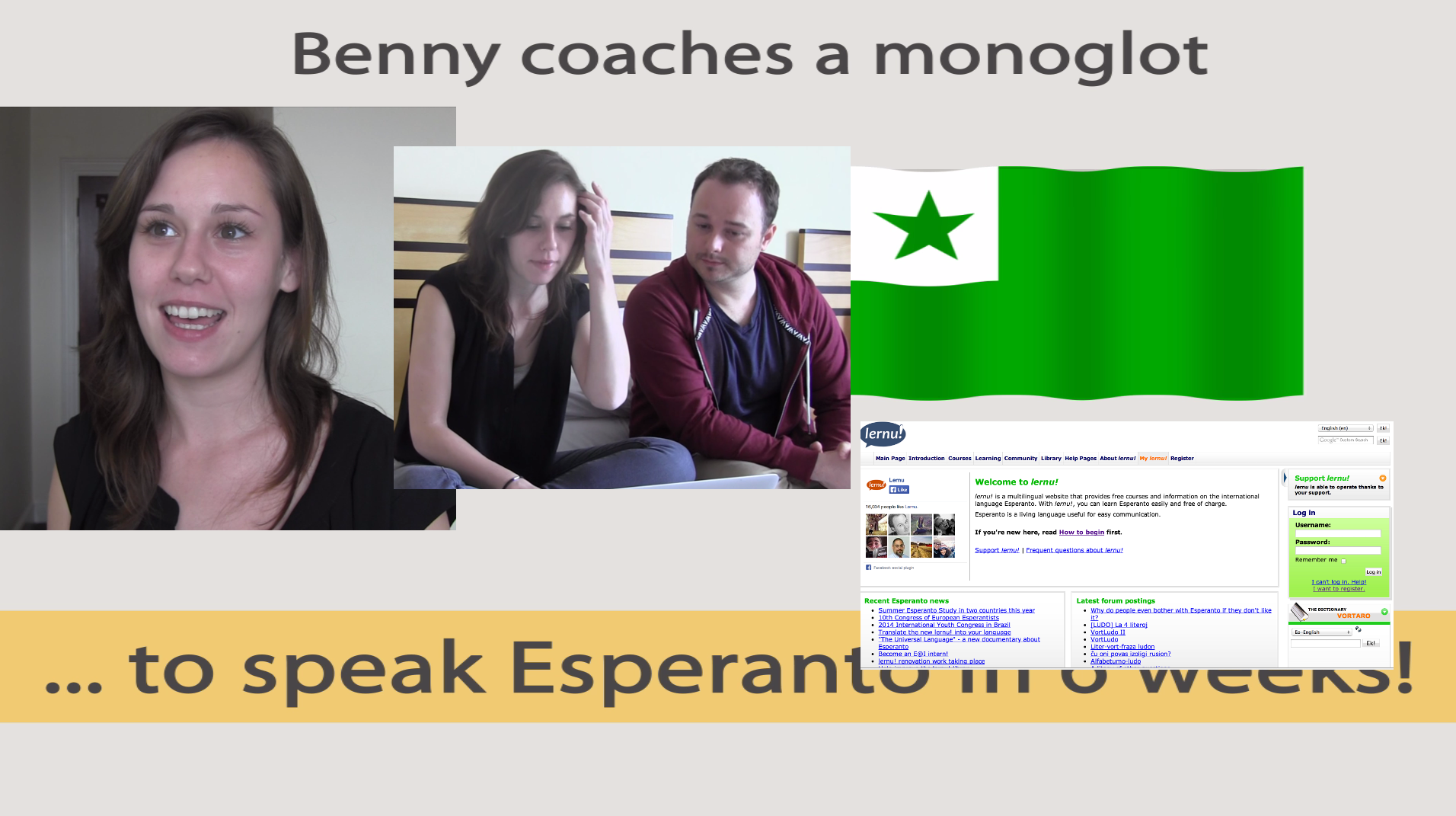Week 1 of a monoglot’s first language learning journey (Benny coaches his girlfriend to learn Esperanto)
Time to finally meet the girl I searched the world for! We actually enjoy one another's company for many reasons, and language learning had nothing to do with it. She was actually a monoglot…. until today!
Since I'm too busy on my book tour and maintaining my languages this year to learn a new language, she said that she would love to get into language learning herself. Thinking long-term though, I highly recommended that she start with Esperanto. It also turns out that a group of other people are learning Esperanto at the same time, with the deadline of the polyglot conference in Berlin, so we ran with that idea!
Like myself, she is working a lot as well as moving home almost every single day on this tour, so she could only invest 1-2 hours a day, but we are using this time to prepare to socialize in the language by June, and I hope you will enjoy seeing her progress!
EVERY second of language learning documented!

I have had many language learning projects myself, but this one is the first one that I get to document of another person. Lauren, my girlfriend, had the great idea that we should have the camera rolling every single second that she is studying, speaking, using or otherwise getting some kind of exposure to Esperanto.
Over the space of 6 days we had over seven and a half hours of footage, and I edited the best realizations down into today's 13 minute video (above). I hope you enjoy it! This way you can see the gradual but definite progress of a genuine beginner language learner to a more confident speaker, from start to finish.
Don't forget to activate subtitles on Youtube to follow along with everything. Subtitles are in English and Esperanto 😉
Lauren's own thoughts on week 1
The video focuses on my observations of her own progress (as a voice-over), but a lot of you wanted to know things from my girlfriend's perspective! As well as her thoughts in the video, she has contributed to today's blog post! Here you go (everything in quotation marks was written by her!):
“When I first started out, I initially felt overwhelmed by all the possible ways I could start.
I was worried about picking the perfect materials to start with, even though from listening to Benny talk to language learners all the time, I know that there's really no such thing, and that you just have to jump into it, but with such a huge task in front of you and so much to do, it's a really hard feeling to shake.
Feeling “dumb” and awkward in starting out
Another silly thing that happened, and that I didn't expect, was that I felt very shy to practice sounding out the Esperanto words in front of Benny, since he was in the room, is fluent in the language, and would be able to hear each and every once of my (many many) mistakes.
It feels so awkward to start forming these brand new sounds, and I felt completely inept starting out, because I literally didn't know how to do ANYTHING in the language. Every word, every letter was a challenge. I hear people tell Benny all the time that they feel “dumb” or childish when starting to speak a new language, and I completely experienced this feeling myself knowing that I was butchering the language in front of him.”
The way she got over that was … just to keep doing it!
After a while, she felt more and more comfortable practising her words and sentences out loud, and now she talks away to herself while I'm in the room, and without trying to be quiet enough that I can't hear 😉
Being bored
“One thing that surprised me was how tired I felt once I started each one of my learning sessions. I guess I was using new parts of my brain that I don't generally use… I'm not really sure what it was, but I joked with Benny that he could make an entire video just of clips of me yawning.”
I like to call this “brain melting” and it happens to me all the time too 😉 This tiredness hits her after every intensive session.
One major issue we had on day one though, within her first hour, was that she was already starting to get bored! This was a problem–and in language learning, if whatever you are doing is truly boring you and sapping your motivation, then you need to change your approach.
In her case, she discovered that the first Lernu! course that she started with (Bildoj kaj Demandoj) didn't work for her learning style (it was more of a Rosetta Stone style images-based course with no translations or explanations), and as soon as she switched to a different beginner's course, Ana Pana, she got much more into it, and boredom wasn't a problem for the rest of the week!
Mini-mission of the week:
“One of the first things I did during my starting hours were to jump into learning phrases from the course, because I wanted to learn to say things right away. But I kept forgetting how to pronounce the letters of the Esperanto alphabet, because they have an “s”and a “ŝ” which make different sounds, for example, and I kept confusing them.”
This pronunciation problem was holding Lauren back when she tried to learn and pronounce new words, and this is the perfect example of when a “mini-mission” should be used. To solve this problem and allow her to move on, she spent some time focusing only on mastering the phonetic pronunciation.
I was able to coach her in a really efficient way to do this. Her first instinct was to pull up the Esperanto Alphabet and start pronouncing each letter one by one, to hopefully memorize their sounds by rote repetition.
But I intervened here and suggested a much more interesting way to practice her pronunciation that also allowed her to use the language. I had her go to the Wikipedia home page, and then search for a topic (for this we chose to read about her home town) while changing the language to Esperanto. I then asked her to read the first part of the article so that she could practice pronouncing the letters as they were used the context of real sentences and words.
“I discovered a lot about myself as a learner this week. For one, I'm much more impatient than I imagined I would be! I got tired very quickly of doing the same task for a long period of time, so I had to set up 3 or 4 different activities that I could turn to when one started to get tiring to keep my brain fresh.”
Thanks for that Lauren! You'll be hearing (and seeing!) much more from her in the coming weeks 😉
An important part of the first week for Lauren was to bounce between different exercises to keep things interesting. So she alternated between working on the Ana Pana course on Lernu!, building her vocabulary and developing memory aids on Memrise, practising her phrases with me, and reading random articles in Esperanto on Wikipedia to practise her pronunciation.
Resources we used this week
The main resources Lauren used this week were:
Forvo, Memrise and Wikipedia are helpful for learning ANY language–definitely not just Esperanto.
Forvo was especially important for Lauren's first week, as she found it very frustrating to read new words without knowing how they sounded. She said that being unsure of how to pronounce new words while also not knowing their meanings was too much uncertainty and made her feel overwhelmed.
For this problem, Forvo is one of the best resources. Their website allows you to search for any word in a large number of languages and hear the way the word is pronounced. Though Lernu! courses also provide soundbites, our internet connection was slow that day, so the long full-sentence sound clips on Lernu! weren't working well, and Lauren often turned to Forvo as a very helpful alternative when she just had to know how to pronounce a single word before she felt comfortable forward.
Memrise helped her to remember Esperanto vocabulary when simply repeating new words and their translations wasn't making them stick. Memrise helped her remember that Seka means Dry (Her mnemonic was “In the DRY desert, water evaporates in a SEKond”), and that Vespero means Evening (“In the evening, you need to be quiet and whispero”).
Esperanto-specific resources
Lernu! is the best website I know of for learning Esperanto. Their site offers a range of free online Esperanto courses, vocabulary lists, grammar exercises, a great dictionary, and many other resources. We used this site every day.
Lauren's favorite course to start on Lernu! was Ana Pana, which taught her new words and phrases and then had her use what she'd just learned to produce her own phrases. The first course she tried, Bildoj kaj Demandoj, didn't work as well for her learning style, because it uses an Esperanto-only approach with no English translations, which is popular with a lot of learners, but didn't keep Lauren's focus.
Lernu! intentionally provides this range of different materials so that it can help people with totally different learning styles, and from this initial mis-step Lauren learned early on that you need to experiment–but not give up!–when a particular approach doesn't work well for you at first!
Lauren also used the Esperanto dictionary on the Lernu! site several times to create new sentences she wanted to say, and she even used the Live Chat feature right on the Lernu! homepage (although she found it intimidating at first) to have a fluent speaker correct the self-introduction she made for the start of this video! She simply learned to type in, “Hello, is this sentence good?” and then pasted in her sentence, and got an immediate correction from friendly and helpful Esperantists!
Moving forward
On day 5 of week one, we already had a sort-of conversation, based on an exercise she had done that day. She was ready for this conversation before I expected! But we ended the week with an intro to the video she would record, and prepare herself and with the help of people she found online.
Over the next weeks, we'll start talking more in Esperanto, hopefully Skyping some people, and if things go according to plan, by mid-June she'll be ready to socialize for the first time in her life not using English!
Update:
You can read the summaries of each week:



Social